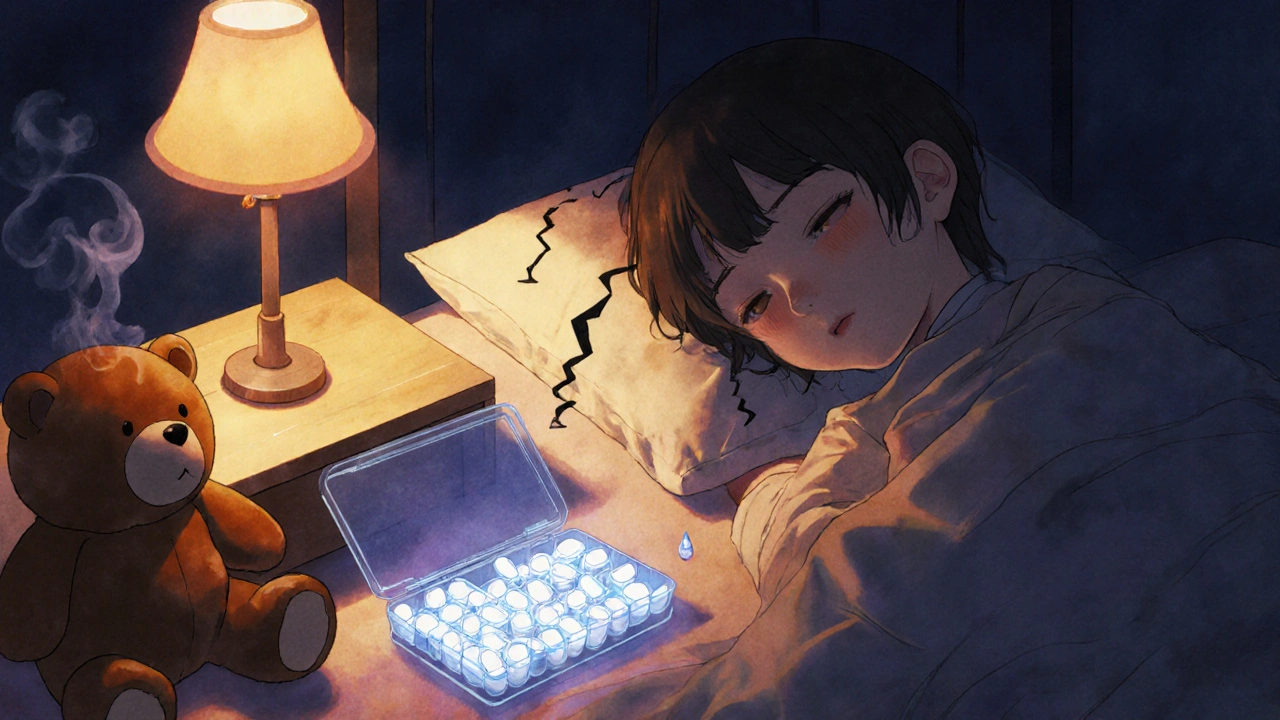
Montelukast isn’t a rescue inhaler. It won’t stop a sudden asthma attack. But if you’re using it daily as prescribed, it can quietly cut down your flare-ups, reduce your reliance on steroids, and help you breathe easier over time. Many people take it without knowing why it works-or worse, skip doses because they don’t feel immediate results. That’s where things go wrong. Montelukast isn’t magic. It’s medicine that builds up in your system, and getting it right takes more than just swallowing a pill.
How Montelukast Actually Works
Montelukast is a leukotriene receptor antagonist. That’s a fancy way of saying it blocks chemicals in your body called leukotrienes. These chemicals are released during allergic reactions and asthma flare-ups. They cause your airways to swell, tighten, and produce extra mucus. By blocking them, montelukast reduces inflammation and keeps your airways more open.
Unlike inhalers that act fast, montelukast takes days to weeks to show full effect. It doesn’t cure asthma. It doesn’t replace your rescue inhaler. But studies show it reduces asthma exacerbations by about 30% in adults and children over 12 months old when used consistently. The FDA approved it for maintenance in 1998, and since then, it’s been used in over 100 countries.
It’s often paired with inhaled corticosteroids-especially in kids or people with allergic asthma. In fact, the Global Initiative for Asthma (GINA) guidelines list montelukast as a step 2 option for mild persistent asthma, especially when inhalers are hard to use or when allergies are a major trigger.
When and How to Take It
Timing matters. Montelukast is usually taken once a day, in the evening. Why? Because asthma symptoms often worsen at night. Taking it at night helps keep leukotriene levels low during the most vulnerable hours. Some people take it in the morning because of busy schedules, but research shows evening dosing gives better overnight control.
It can be taken with or without food. But if you notice stomach upset, try taking it with a light snack. Don’t crush or chew the tablet unless your doctor says so-especially for the chewable form meant for kids. The granules in the sachet can be mixed with soft food like applesauce or yogurt, but never with liquids.
Missing a dose? If you forget, take it as soon as you remember. But if it’s almost time for the next dose, skip the missed one. Never double up. Taking two doses in one day doesn’t make it work faster-it just increases your risk of side effects.
Common Side Effects and What to Watch For
Most people tolerate montelukast well. The most common side effects are mild: headache, stomach pain, sore throat, or a stuffy nose. These usually fade after the first week.
But there’s a serious concern that’s often overlooked: neuropsychiatric side effects. The FDA issued a black box warning in 2020 after reports of depression, agitation, sleep disturbances, hallucinations, and even suicidal thoughts in some users. These are rare-but real. If you or your child starts feeling unusually anxious, sad, restless, or has trouble sleeping after starting montelukast, talk to your doctor immediately. Don’t wait. Don’t assume it’s just stress.
Keep a symptom diary. Note mood changes, sleep patterns, and asthma control. Bring it to your next appointment. This helps your doctor decide whether to keep the medication, adjust the dose, or switch.
What Montelukast Doesn’t Do
Montelukast won’t stop an asthma attack. If you’re wheezing, coughing, or feeling tightness in your chest, use your rescue inhaler (like albuterol). Montelukast is for prevention-not rescue.
It also won’t help with every type of asthma. It works best for allergic asthma, exercise-induced asthma, or asthma linked to seasonal allergies. If your asthma is triggered mainly by cold air, smoke, or stress without allergies, montelukast might not help much. Your doctor can test for IgE levels or skin allergies to see if you’re a good candidate.
And it doesn’t replace your controller inhaler if you’re already on one. Many people stop their steroid inhalers once they start montelukast-thinking it’s enough. That’s dangerous. Montelukast doesn’t reduce airway inflammation as powerfully as inhaled corticosteroids. It’s often used alongside them, not instead of them.

How to Know If It’s Working
You won’t feel a difference right away. But over time, you should notice:
- Fewer nighttime awakenings because of coughing or wheezing
- Less use of your rescue inhaler (like going from 4 times a week to once a week)
- More days without asthma symptoms
- Better ability to exercise without getting winded
Track your peak flow readings if you have a meter. A steady or improving peak flow over 4-6 weeks is a strong sign the medication is helping. If your peak flow drops or your symptoms stay the same after 8 weeks, talk to your doctor. You might need a different approach.
Drug Interactions to Avoid
Montelukast has few interactions, but a few are important:
- Phenytoin and phenobarbital (used for seizures) can make montelukast less effective.
- Rifampin (an antibiotic for TB) also reduces its levels in your body.
- Aspirin or NSAIDs like ibuprofen don’t directly interact, but if you have aspirin-exacerbated respiratory disease (AERD), montelukast may help control that condition.
Always tell your pharmacist and doctor about every supplement or OTC medicine you take. Even herbal products like St. John’s wort can interfere with how your liver processes montelukast.
Special Considerations for Kids and Pregnant Women
Montelukast is approved for children as young as 12 months. The chewable tablets and granules make it easier for kids to take. But parents need to be extra careful about monitoring mood changes. A child who suddenly becomes withdrawn, aggressive, or has nightmares may be reacting to the medication.
For pregnant women, montelukast is classified as Category B. That means animal studies haven’t shown harm, and human data so far hasn’t raised red flags. But no drug is 100% safe in pregnancy. If you’re pregnant or planning to be, talk to your doctor about whether the benefits outweigh the unknowns. Many women continue it because uncontrolled asthma poses a bigger risk to the baby than the medication.

What to Do If It’s Not Working
If you’ve taken montelukast daily for 8 weeks and still have symptoms, don’t just keep taking it hoping it’ll kick in. Ask your doctor to:
- Check your inhaler technique
- Review your trigger avoidance (dust, pets, pollen, smoke)
- Test for allergies or sinus issues
- Consider switching to a different controller, like a long-acting beta agonist or a biologic (like omalizumab) if allergies are severe
Some people respond better to combination inhalers (like fluticasone/salmeterol). Montelukast isn’t the only option-it’s just one tool.
Sticking With It: Real-Life Tips
Consistency is everything. Here’s how to make it stick:
- Set a daily phone alarm for 8 PM-no excuses.
- Keep the pill bottle next to your toothbrush or coffee maker. Habit stacking works.
- Use a pill organizer with days of the week. If you see a missed day, you’ll notice.
- Ask a family member to remind you if you forget.
- Don’t stop because you feel fine. Asthma is silent until it’s not.
One patient I worked with in Melbourne stopped montelukast after three months because she felt fine. Two weeks later, she ended up in the ER with severe asthma. She didn’t realize how much better she’d been feeling because of the medication. That’s the quiet success of montelukast-it helps you feel normal without you noticing.
When to Talk to Your Doctor
Call your doctor if:
- You have mood changes, anxiety, or trouble sleeping
- Your asthma gets worse despite taking it
- You need your rescue inhaler more than twice a week
- You’re planning pregnancy or breastfeeding
- You’re starting a new medication
Don’t wait for a scheduled appointment. These signs matter.
Can montelukast be used for allergies alone?
Yes, montelukast is approved for allergic rhinitis (hay fever) in people over 2 years old. It helps with sneezing, runny nose, and itchy eyes, especially when allergy symptoms overlap with asthma. But it’s not as fast-acting as antihistamines like cetirizine. For pure seasonal allergies, an antihistamine may work better. For people with both asthma and allergies, montelukast offers dual benefits.
Is montelukast safe for long-term use?
Studies show montelukast is safe for long-term use in both adults and children. The most common side effects-headache, stomach upset-are mild and tend to fade. The neuropsychiatric risks are rare but serious. Long-term users should have annual check-ins with their doctor to review symptoms, mood, and asthma control. There’s no evidence it causes organ damage or dependency.
Can I stop montelukast if my asthma improves?
Never stop without talking to your doctor. Even if you feel fine, your airways may still be inflamed. Stopping suddenly can lead to rebound symptoms or worsening asthma. Your doctor may suggest gradually reducing the dose or switching to another controller. But stopping cold turkey is risky.
Does montelukast cause weight gain?
No, weight gain isn’t a known side effect of montelukast. Unlike oral steroids, which can increase appetite and fluid retention, montelukast doesn’t affect metabolism or hormones in that way. If you notice unexplained weight gain while taking it, look at other factors like diet, activity levels, or other medications.
What’s the difference between montelukast and albuterol?
Montelukast is a daily maintenance drug that reduces inflammation and prevents attacks. Albuterol is a rescue inhaler that opens airways within minutes during an attack. They work differently and are often used together. Montelukast keeps your airways calm over time. Albuterol gives quick relief when you’re struggling to breathe. One doesn’t replace the other.
Final Thought: Patience and Awareness
Montelukast is one of the most underrated asthma tools. It’s not flashy. It doesn’t make you feel better instantly. But for thousands of people, it’s the reason they can sleep through the night, play with their kids, or go for a run without gasping. The key isn’t just taking it-it’s paying attention to how you feel, watching for warning signs, and staying in touch with your doctor. It’s not about perfection. It’s about persistence.






There are 15 Comments
Mike Gordon
Montelukast is the quiet hero of asthma management-no fanfare, no instant rush, just steady work. I’ve been on it for 5 years. My kid used to wake up coughing every other night. Now? Solid sleep. No ER trips. No steroid spikes. It’s not sexy, but it’s life-changing if you stick with it.
Kathy Pilkinton
Let’s be real-this drug has a black box warning for a reason. I watched my niece turn into a different person after starting montelukast. Angry. Withdrawn. Sleepwalking. We stopped it. Within 3 days, she was back. If your doc pushes this without asking about mental health, find a new doc. This isn’t ‘just a pill’-it’s a chemical mood modifier.
Holly Dorger
I take this every night at 8pm like clockwork. I used to forget all the time until I started keeping it next to my toothpaste. Now I brush and take it together. My peak flow has improved by 15% in 6 weeks. Also, I have no idea what leukotrienes are but I’m glad they’re being blocked. Thanks for the info.
Amanda Nicolson
Okay I need to say this out loud-montelukast is the reason I can finally play with my toddler without gasping like a fish out of water. I used to dread bedtime because I’d wake up wheezing. Now I sleep. I run. I laugh. And I didn’t even realize how much I’d been holding my breath until this pill let me breathe again. It’s not magic, but it’s close. And yes, I still keep my albuterol right beside it. Just in case.
Jackson Olsen
took it for a month. felt nothing. stopped. got sick again. started back. felt better. its weird how it works slow. but it works. dont stop just cause you feel ok.
Penny Clark
My daughter’s been on montelukast since she was 3. She’s 11 now. No mood changes. Just fewer colds turning into asthma flares. I keep a little notebook-track her symptoms, sleep, rescue inhaler use. It helps the doc see the real picture. Also, I use the chewables with applesauce. She thinks it’s dessert. 😊
Niki Tiki
Why are we letting Big Pharma push this weak-ass drug like it’s a miracle? In my day we just used inhalers and stayed away from pollen. Now we got pills for everything. And don’t even get me started on the mental side effects. This country is overmedicated. I’d rather just avoid triggers and breathe on my own.
Jim Allen
Montelukast is basically just a placebo with a fancy name and a lawsuit waiting to happen. I mean, if you really think blocking some chemical is gonna fix your asthma… you’re missing the bigger picture. Life is chaos. Your body is chaos. You can’t chemically order your way out of it. Maybe just chill. Breathe slow. Stop medicating every twitch.
Nate Girard
Just wanted to say thank you for this post. I was about to quit montelukast because I didn’t feel anything. Then I looked back at my journal-my rescue inhaler use dropped from 5x/week to 1x. I didn’t even notice. That’s the quiet win. Keep going. You’re doing better than you think.
Carolyn Kiger
My mom has had asthma since the 80s. She tried everything. Montelukast was the first thing that actually gave her consistent control without steroids. She takes it with her evening tea. No drama. No side effects. Just peace. Sometimes the simplest tools are the most powerful.
krishna raut
Works great for allergic asthma. Take at night. Don’t skip. Simple.
Prakash pawar
People these days are so addicted to pills they forget their lungs are part of nature. Montelukast is a bandaid on a bullet wound. The real solution? Clean air. Less pollution. Stop living in plastic boxes with AC and allergens everywhere. This drug lets you survive the mess you made. Not fix it.
MOLLY SURNO
Thank you for the comprehensive overview. The emphasis on neuropsychiatric monitoring is particularly valuable. I will ensure my adolescent patient is followed closely with structured mood assessments every four weeks during the initial three months of therapy.
Alex Hundert
My sister stopped montelukast cold turkey because she thought she was ‘cured.’ Two weeks later, she was in the hospital with status asthmaticus. Don’t be her. Even if you feel fine, your airways aren’t. This isn’t optional-it’s maintenance. Like brushing your teeth.
Emily Kidd
i forgot to take mine for 3 days and my peak flow dropped like a rock. i felt fine but my numbers told the truth. now i have a reminder on my phone labeled ‘breathe easy.’ also i spell montelukast wrong like 80% of the time lol
Write a comment
Your email address will not be published. Required fields are marked *